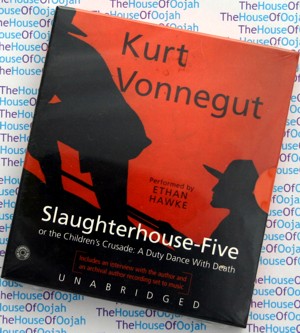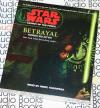Slaughterhouse Five by Kurt Vonnegut - Audio Book CD Unabridged

Slaughterhouse Fiveby Kurt Vonnegutor the Children's Crusade: A Duty Dance with Death Get Other Science Fiction Audio Books CD click here |
 |
Slaughterhouse Five - Kurt Vonnegut - AudioBook CDBrand New : Unabridged 5 Audio CDs 6 Hours Slaughterhouse-Five; or, The Children's Crusade: A Duty-Dance With Death is a 1969 novel by Kurt Vonnegut. One of his most popular works and widely regarded as a classic, it combines science fiction elements with an analysis of the human condition from an uncommon perspective, using time travel as a plot device. The bombing of Dresden in World War II, the aftermath of which Vonnegut witnessed, is the starting point. Slaughterhouse-Five spans the life of a man who has "come unstuck in time." It is the story of Billy Pilgrim experiencing different time periods of his life, most notably his experience in World War II and his relationship with his family. The book is a series of seemingly random happenings that, in combination, present the thematic elements of the novel in an unraveling order. Slaughterhouse-Five or The Children's Crusade: A Duty-Dance With Death by Kurt Vonnegut, a fourth-generation German-American now living in Cape Cod, who, as an American infantry scout hors de combat, as a prisoner of war, witnessed the fire-bombing of Dresden, Germany, "The Florence of the Elbe," a long time ago, and survived to tell the tale. The short title, "Slaughterhouse-Five," refers to the slaughterhouse (Schlachthof-Fünf in German) in which the main character, Billy Pilgrim, stays as a prisoner of war in Dresden during the firebombing. (Billy's fictional experience of the slaughterhouse parallels Vonnegut's own experience as a prisoner of war in Dresden.) Vonnegut, as he does in some of his other works such as Breakfast of Champions, offers an alternative title for this book: The Children's Crusade: A Duty-Dance With Death. The narrator explains that the first part of the subtitle in the first chapter is a reference to the Children's Crusade of the 13th century, in which children were sold as slaves (some people dispute the facts of the actual historical event, but for literary purposes, the purposeful selling of children into slavery is the intended meaning). In the first chapter of the novel, the narrator relates how he visited a former Army buddy to discuss incidents he might use in the novel. His friend's wife gave him a cold reception and finally denounced him for wanting to write a novel in which he and his friends would be heroes instead of simply scared young men, and that would encourage more wars in which children would be sent to die. The narrator agrees that he and his friends were nothing more than children on the brink of adulthood. On the spot, he promised to call the novel "The Children's Crusade". He writes, "She was my friend after that".
About the Author Kurt VonnegutKurt Vonnegut, Jr. (November 11, 1922 – April 11, 2007) was a prolific and genre-bending American novelist known for works blending satire, black comedy and science fiction, such as Slaughterhouse-Five (1969), Cat's Cradle (1963), and Breakfast of Champions (1973). Kurt Vonnegut was born to fourth-generation German-American parents, son and grandson of architects in the Indianapolis firm Vonnegut & Bohn, on Armistice Day. As a student at Shortridge High School in Indianapolis, Vonnegut worked on the nation's first daily high school newspaper, The Daily Echo. He attended Cornell University from 1940 to 1943[5], where he served as assistant managing editor and associate editor for the student newspaper, the Cornell Daily Sun, and majored in chemistry. While attending Cornell, he was a member of the Delta Upsilon Fraternity, following in the footsteps of his father. While at Cornell, Vonnegut was drafted into the U.S. Army. The army sent him to the Carnegie Institute of Technology (now Carnegie Mellon University) and the University of Tennessee to study mechanical engineering. On May 14, 1944, Mothers' Day, his mother, Edith S. (Lieber) Vonnegut, committed suicide. Kurt Vonnegut's experience as a soldier and prisoner of war had a profound influence on his later work. As a Private with the 106th Infantry Division, Vonnegut was cut off from his battalion along with 5 other battalion scouts and wandered behind enemy lines for several days until captured by Wehrmacht troops on December 14, 1944. Imprisoned in Dresden, Vonnegut witnessed the fire bombing of Dresden in February 1945, which destroyed most of the city. Vonnegut was one of a few American prisoners of war in Dresden to survive, in their cell in an underground meat locker of a slaughterhouse that had been converted to a prison camp. The administration building had the postal address Schlachthof Fünf (Slaughterhouse Five) which the prisoners took to using as the name for the whole camp. Vonnegut recalled the facility as "Utter destruction", "carnage unfathomable." The Germans put him to work gathering bodies for mass burial. "But there were too many corpses to bury. So instead the Nazis sent in troops with flamethrowers. All these civilians' remains were burned to ashes." This experience formed the core of one of his most famous works, Slaughterhouse-Five, and is a theme in at least six other books. Vonnegut was freed by Red Army troops in May 1945. Upon returning to America, he was awarded a Purple Heart for what he called a "ludicrously negligible wound," later writing in Timequake that he was given the decoration after suffering a case of "frostbite." After the war, Vonnegut attended the University of Chicago as a graduate student in anthropology and also worked as a police reporter at the City News Bureau of Chicago. According to Vonnegut in Bagombo Snuff Box, the university rejected his first thesis on the necessity of accounting for the similarities between Cubist painters and the leaders of late 19th century Native American uprisings, saying it was "unprofessional." He left Chicago to work in Schenectady, New York, in public relations for General Electric. The University of Chicago later accepted his novel Cat's Cradle as his thesis, citing its anthropological content and awarded him the M.A. degree in 1971. On the verge of abandoning writing, Vonnegut was offered a teaching job at the University of Iowa Writers' Workshop. While he was there, Cat's Cradle became a best-seller, and he began Slaughterhouse-Five, now considered one of the best American novels of the 20th century, appearing on the 100 best lists of Time magazine and the Modern Library. Early in his adult life, he moved to Barnstable, Massachusetts, a town on Cape Cod. |
Slaughterhouse Five - Kurt Vonnegut - AudioBook CD |
| Retail: | $47.95 |
| On Sale: | $34.95 |
| You Save: | 28% |
| Stock Info: | Out Of Stock |
| Receive In Stock Notification |

 0 Items (Empty)
0 Items (Empty)


